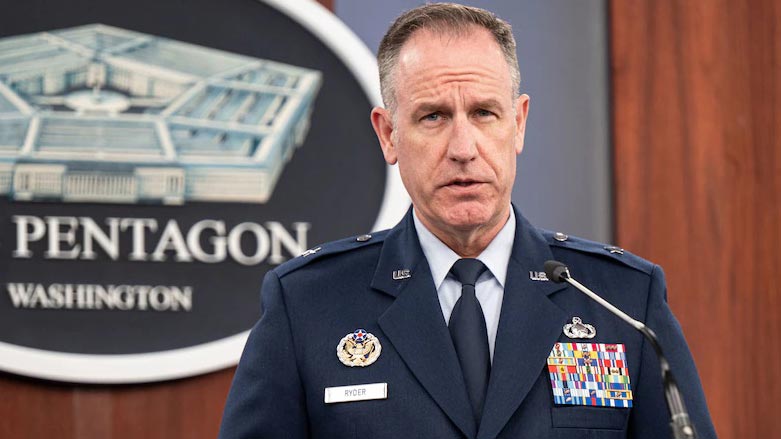US: Iraqi Forces, including Peshmerga, have Played ‘Vital Role” in Reducing ISIS Threat
“We’ll continue to work with our Iraqi partners, our Peshmerga partners, to address this threat," Ryder said.

WASHINGTON DC, United States (Kurdistan 24) – Pentagon Press Secretary, Maj. Gen. Patrick Ryder, in a press briefing on Tuesday, had high praise for the role of the Iraqi Security Forces, including the Peshmerga, in significantly reducing the threat posed by ISIS in Iraq.
“Iraqi Security Forces writ large, which includes Peshmerga, have played a vital role in terms of reducing the threat that ISIS poses,” Ryder said, as he answered a question from Kurdistan 24’s Washington Bureau Chief.
But Ryder also noted the importance of sustaining the effort against ISIS. He pointed to the threat that it poses elsewhere, noting, “As we’ve seen in places like Afghanistan, left unchecked, ISIS can start to make a resurgence.”
“And so, again, Ryder added, “We’ll continue to work with our Iraqi partners, our Peshmerga partners, to address this threat.”
The U.S.-Iraq Higher Military Commission
Baghdad is engaged in a difficult balancing act between the U.S. and Iran, as Shafaq News, an Iraqi newspaper, reported on Tuesday,
“Iraq’s efforts to navigate its complex geopolitical landscape are increasingly evident, as it seeks a balance between maintaining strong ties with the United States and accommodating Iranian influence within its borders,” it explained.
The long-time Kurdish leader, Masoud Barzani, now head of the Kurdistan Democratic Party (KDP), recently advised the U.S. ambassador in Baghdad, Alina Romanowski, that it is important for U.S. troops to remain in Iraq, describing it as a national issue transcending party lines, essential to the maintenance of Iraq's stability and its pursuit of its national interests.
Read More: KDP President Masoud Barzani meets with US Ambassador to Iraq
One aspect of Tehran’s efforts to strengthen its position in Iraq and undermine the U.S. position is disinformation. The government of Prime Minister Mohammed Shi’a al-Sudani has been pressing for a normalization of Iraq’s security relations with members of the anti-ISIS Coalition, including the U.S.
That involves a “transition,” as U.S. officials have repeatedly explained, from a U.S. military presence based on the anti-ISIS Coalition to one based on a bilateral security relationship.
But pro-Iranian elements in Baghdad portray the talks as negotiations over the presence of U.S. forces in Iraq more broadly. And they portray the objective of the talks as ending the U.S. military presence in Iraq.
Last week, a journalist, in fact, a Kurdish reporter, echoed the Iranian line at a State Department briefing. Assuming, wrongly, that an Iranian-inspired report was actually true, in his questions, he pressed the issue of the supposed imminent departure of U.S. forces from Iraq.
That led the briefer, Deputy Press Secretary Vedant Patel, to explain clearly that the talks between Washington and Baghdad about the future of the anti-ISIS Coalition had been ongoing since late 2023, but “at no point did we discuss the withdrawal of U.S. forces from Iraq.”
Read More: US, Iraq Discuss Transition of Forces—not Their Withdrawal
Evidently, that created some embarrassment within the Iraqi government. A spokesman denounced Patel’s statement as “an inaccurate answer in response to a question from a journalist.”
At the same time, the spokesman said, “The announcement of the end of the military mission of the international coalition in Iraq has been postponed due to recent developments”--without providing any further detail.
Thus, when the same issue arose on Tuesday in the Pentagon briefing, Ryder responded, “I just don’t have any updates to provide right now.
As Ryder explained, “Our relationship with Iraq is a strong one,” and “we’re there at the invitation of the Government of Iraq and will continue to have the discussions through the Higher Military Commission and through our U.S.-Iraq Joint Security Cooperation dialogue to look at not only what the future of the Coalition is, but also what our longer term U.S.-Iraq bilateral security relationship will be.”